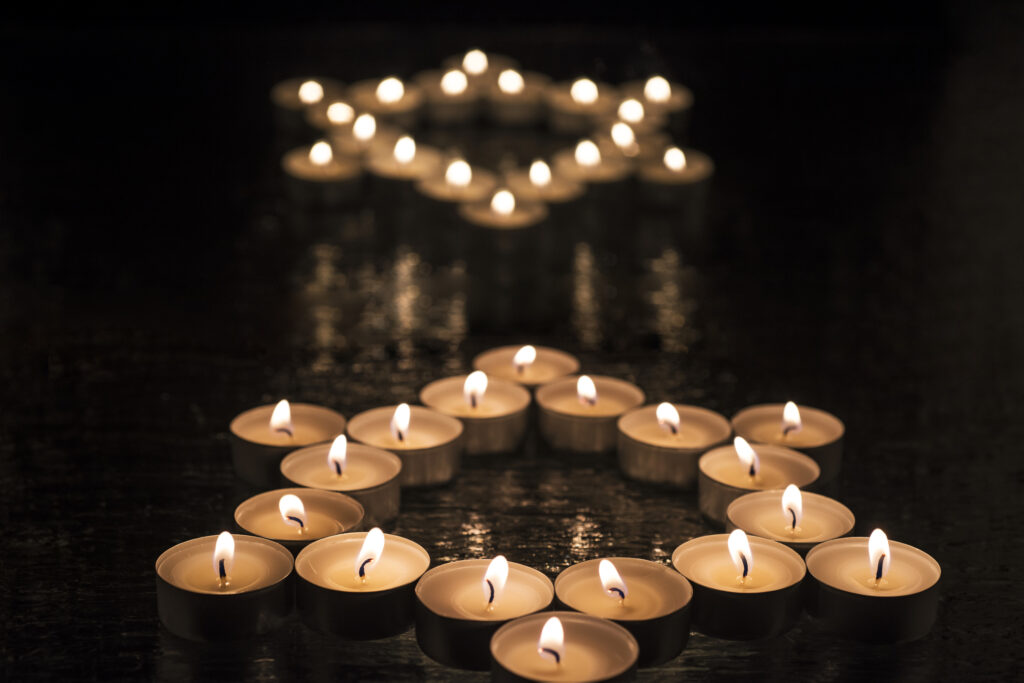Light
by J.G.
This story is based on the life of Alec and his parents, Dyna and Jakob, who were living in Lodz when Germany invaded Poland in 1939. Some names have been altered to protect the privacy of living individuals and some gaps in the story have been filled in; however, it otherwise corresponds to the facts as I know them.
1937. It’s still cold in the early spring when Dyna and Jakob take two-year old Oles for a walk in their Lodz, Poland neighborhood. They are all bundled up in thick clothes despite the sunshine, but the warm sun feels good and people on the street are cheerful in the bright light. Oles is holding his father’s hand. When he sees another small child holding her mother’s hand, he impulsively reaches out and takes hers and the four of them walk along for a few minutes while Dyna snaps a picture. Jakob will later send a copy to his sister “Lizo” fighting Franco in Spain, titling it as his little one’s “first flirt.”
Late 1942 or early 1943. Ever since Oles and his mother avoided the Lodz Ghetto by heading for Warsaw, there has been no word from Jakob, who insisted on staying, confident his bank director job would keep him safe. They have stayed with Dyna’s family, first in the city and then in the ghetto. By now, it is clear that the Warsaw ghetto is being liquidated and that most deportees are going to their deaths. The adults in the family work in the Toebbens uniform factory, work that offers a bit of protection from deportation. Children who are too young to work are expendable to the Nazis, so they hide Oles and his cousin in a closet used to store wool fabric. Is the darkness comforting or frightening to the two seven-year-olds? Oles is hungry and numb, trying to shut out the fear and death around him, the prized little metal train he left behind in Lodz, and chess games from earlier days in the ghetto, distant memories. As the situation becomes more desperate, Dyna somehow secures a way out and a place to shelter briefly in Aryan Warsaw. One morning, Dyna and Oles escape with a work party and remove their Jewish stars. Once out, they move often. The prying eyes and ears of people who could betray them seem to be everywhere — antisemitic Poles, frightened ones, Volksdeutsche. They live in houses, barns, and in the forest with partisans.
1943 or 1944. For a young Jewish boy in hiding, especially one with dark, wavy hair, light is threatening. They are living in a house somewhere in the Polish countryside. Dyna goes out during the day, explained as help hired for the house and farm. Her labor and occasional coins or jewelry that she has sown into her coat provide some compensation to their hosts, who are risking their lives to shelter them as part of their private war against the Nazis. Oles spends his days hidden in a closet, cellar, or attic. At night, he must still be careful. Even a small shadow cast on a window curtain from a candle could raise suspicion. When his mother has time, she teaches him math and Polish and tells him stories. When he is alone, Oles must rely on his imagination and the few toys that fit in the matchbox in his pocket – mainly dried beans with different spot patterns. He could use those to make any game.
Eventually, he is seen by a neighbor in the window – in this house where his presence is a great danger to everyone, and he should never be seen. The neighbor has already noted enviously that this family is doing a bit better than before. Perhaps they have a new chicken or pig. The family tells the neighbor what she saw was their grandfather’s ghost. Whether the lie is believed does not matter; the hideout is no longer safe and once again they must leave. Perhaps this time, Oles hides with his mother in a new place or maybe this is the time when in desperation, she hides him in a church where he will learn that Jews are bad.
Mid-1944. Captured, Dyna and Oles are loaded into a boxcar. Like the other “passengers,” they assume they are doomed, headed to a death camp. The train rumbles slowly forward for hours and then stops. Hours pass. Eventually they realize their guards have left and they and the others manage to get out. Still frightened of betrayal, the escapees survive in the forest for a while by searching out potatoes missed in the harvest. When it becomes clear that the Nazis have left the area, they hesitantly move to a nearby village.
Late 1944. Russian cavalry liberate the small town where Dyna and Oles are hiding. Oles is pale, small, and dangerously thin, with a sunken chest. The soldiers are kind to him. One gives Oles his first chocolate in years. As the front advances westward, they begin the arduous search for surviving family members. They join long lines in Lodz and in Warsaw. Finding no one except Eugeniusz, a camp survivor who knew one of Dyna’s sisters, sometime in 1945 or early 1946, they join relatives living in Paris and wait for an immigration visa. Reluctantly, they conclude Jakob is dead, probably shot early in the war.
1946. Dyna sends Oles to Palestine to live with her sister-in-law and her family for a year in their two-room apartment. In the heat and bright sunlight, 11-year-old Oles will begin to recover and grow stronger. ‘Look forward, not back’ is the mantra. His grandfather, a Hebrew teacher, tells the family to speak to Oles only in Hebrew. For two hours a day, he patiently teaches him Hebrew letters and words using the Book of Genesis as their text. At night, Oles shares the only bedroom with his grandfather and 14-year-old cousin. In October, Oles leaves the family that has come to love him deeply and returns to France. Eugeniusz, the new stepfather he does not like, meets the boat in Marseille. Oles shouts to get his attention, struggling to be heard above the clamor of crew, passengers, and people greeting the ship. Eugeniusz finally spots him. He scowls at Alec, “What are you saying?” Only then does Oles realize that he is speaking Hebrew, not Polish. Soon he is sailing from Marseilles to Sydney with Dyna and Eugeniusz to begin the next chapter of his life as Alec. He seems to embrace this life: School. Friends, mostly other immigrants. Sports. Zionist youth group camps. University.
1958. Alec marries Esther, and they leave Australia for the US to continue their education. That year, Alec laughs, really laughs, for the first time since war broke out in Poland.








